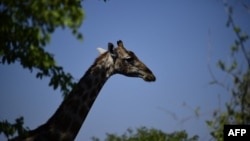The majestic animals were transferred from Namibia to the Iona National Park, one of Angola's largest parks which sits close to the border of the two southern African nations.
The move is the first of "multiple giraffes translocations" which form part of a "conservation effort to restore and enrich the park's biodiversity," African Parks said.
The NGO, which is headed by British royal Prince Harry, manages 22 parks in Africa covering 20 million hectares (49 million acres) in 12 countries.
According to the International Union for Conservation of Nature, IUCN, giraffes were generally accepted as locally extinct in Angola by the late 1990s after parks were ravaged by poachers, until reintroductions into southern Angola from Namibia in 2015.
Known as the Angolan giraffe, the species "has been locally extinct since before the 1980s due to indiscriminate poaching during the Angolan civil war," according to scientific publication the Namibian Journal of Environment in a 2022 report.
Following Angola's transition from the civil war in 2002, the oil-rich nation renewed its commitment to wildlife conservation.
Shortly after the country's independence from Portugal, a bloody civil war that lasted 27 years erupted between guerrilla groups which had taken part in the country's anti-colonial campaign.
Stephanie Fennessy, executive director and co-founder of the Namibia-based Giraffe Conservation Foundation, hailed the transfer in a joint statement with African Parks.
She said by reintroducing the long-necked animals to "their historical range, we re-establish their range, ensure their long-term survival and contribute to restoring the ecological balance in the region."
Angola's government described the move as a "remarkable milestone."
The animals travelled 36 hours by road across 1,300 kilometers (807 miles) from a private farm in central Namibia.








Forum